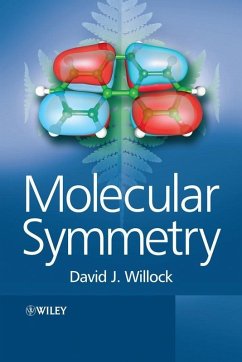Symmetry and group theory provide us with a formal method for the description of the geometry of objects by describing the patterns in their structure. In chemistry it is a powerful method that underlies many apparently disparate phenomena. Symmetry allows us to accurately describe the types of bonding that can occur between atoms or groups of atoms in molecules. It also governs the transitions that may occur between energy levels in molecular systems, which in turn allows us to predict the absorption properties of molecules and hence their spectra. Molecular Symmetry lays out the formal language used in the area using illustrative examples of particular molecules throughout. It then applies the ideas of symmetry to describe molecular structure, bonding in molecules and consider the implications in spectroscopy. Topics covered include: * Symmetry elements * Symmetry operations and products of operations * Point groups used with molecules * Point group representations, matrices and basis sets * Reducible and irreducible representations * Applications in vibrational spectroscopy * Symmetry in chemical bonding Molecular Symmetry is designed to introduce the subject by combining symmetry with spectroscopy in a clear and accessible manner. Each chapter ends with a summary of learning points, a selection of self-test questions, and suggestions for further reading. A set of appendices includes templates for paper models which will help students understand symmetry groups. Molecular Symmetry is a must-have introduction to this fundamental topic for students of chemistry, and will also find a place on the bookshelves of postgraduates and researchers looking for a broad and modern introduction to the subject.
Dieser Download kann aus rechtlichen Gründen nur mit Rechnungsadresse in A, B, BG, CY, CZ, D, DK, EW, E, FIN, F, GR, HR, H, IRL, I, LT, L, LR, M, NL, PL, P, R, S, SLO, SK ausgeliefert werden.
"The work will prove to be a popular choice as a textbook or as anadditional resource for group theory and advanced inorganicchemistry courses." ( CHOICE , November 2009)
"A major strength of this book is its accessibility to thepractically and conceptually minded chemist; the reader is led intothe subject through strong visual presentation of the ideas andalthough the mathematics is by no means ignored, it is presentedwithin an applied context." ( The Higher Education AcademyPhysical Sciences Centre Reviews , May 2009)
"A major strength of this book is its accessibility to thepractically and conceptually minded chemist; the reader is led intothe subject through strong visual presentation of the ideas andalthough the mathematics is by no means ignored, it is presentedwithin an applied context." ( The Higher Education AcademyPhysical Sciences Centre Reviews , May 2009)









